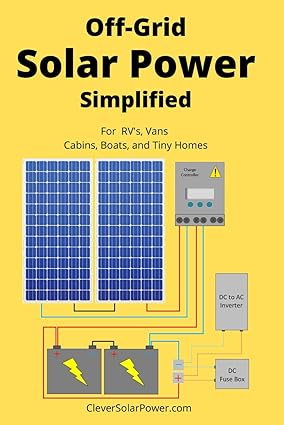"Off-Grid Solar Power Simplified": A Comprehensive Guide to Independent Energy
"Off-Grid Solar Power Simplified" is a practical guide designed to empower individuals and organizations to establish reliable and cost-effective off-grid solar power systems. It caters to a broad audience, from beginners to experienced off-gridders, providing clear explanations and actionable advice for creating autonomous solar systems across diverse applications.
Core Topics Covered:
- Fundamental Energy Principles: The book starts by establishing a foundation in essential energy units and formulas, crucial for understanding and designing solar systems.
- Essential Tools and Equipment: It offers guidance on selecting appropriate tools and materials, emphasizing safety and efficient installation practices, including proper wire sizing and component selection.
- Solar Panels and Inverters: A detailed exploration of various solar panel types (monocrystalline, polycrystalline, thin-film) and inverter technologies (pure sine wave, modified sine wave), highlighting efficiency and power ratings.
- Batteries and Charge Controllers: Comprehensive coverage of deep-cycle battery types (lead-acid, lithium-ion), battery maintenance, and the critical role of charge controllers (MPPT, PWM) in preventing overcharging and optimizing battery lifespan.
- Safety and Installation Practices: A strong focus on safety measures, including proper wiring, grounding, overcurrent protection, and safe battery charging from alternators.
- System Sizing and Design: A step-by-step methodology for calculating energy needs, determining solar panel and battery requirements, and designing a complete off-grid system layout.
- Troubleshooting Basics: Providing a foundation for diagnosing and resolving common issues encountered in off-grid solar systems.
Diverse Use Cases:
- Mobile Living: Powering RVs, vans, and boats for extended travel and recreational activities.
- Remote Dwellings: Providing sustainable energy for cabins, tiny homes, and remote workstations.
- Emergency Preparedness: Supplying critical power during grid outages and natural disasters.
- Agricultural Applications: Powering irrigation pumps, livestock monitoring, and environmental sensors.
- Telecommunications: Supporting remote cell phone towers and communication relays.
- Environmental Monitoring: Enabling remote air and water quality monitoring, and wildlife tracking.
- Remote sensor networks: powering monitoring devices in remote locations.
MATLAB for System Design and Verification:
- MATLAB can be utilized for modeling and simulating system components, optimizing system performance, and verifying system stability and safety.
Broader Context and Reference Categories:
To provide a framework for further exploration, the following categories of references are essential:
- Industry and Research Organizations:
- National Renewable Energy Laboratory (NREL)
- International Renewable Energy Agency (IRENA)
- Solar Energy Industries Association (SEIA)
- International Development and Aid Organizations:
- The World Bank
- United Nations Development Programme (UNDP)
- Technical Standards:
- International Electrotechnical Commission (IEC) standards
- Academic and Technical Publications:
- Journals focused on renewable energy, power electronics, and energy storage.
- Textbooks and handbooks on photovoltaic system design and installation.
- Online resources:
- Reputable solar equipment manufacturer websites.
- Installation guides from trusted solar supply companies.
This summary provides a comprehensive overview of "Off-Grid Solar Power Simplified" and its relevance in the context of modern energy solutions.



